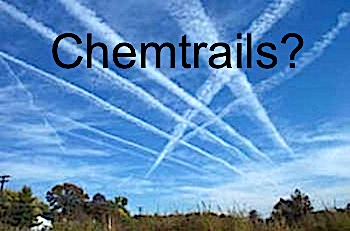GEOENGINEERING WEATHER / ‘CLIMATE CHANGE’

THE DIMMING, [1:56:50] the most comprehensive climate engineering documentary
WEATHER EXTREMES AND CROP FAILURE [55:00] Dane Wigington | GeoengineeringWatch.org
Geoengineering Watch Global Alert News, June 22, 2024, # 463
“Scientists Warn of Looming Threat to US Food Supply” (from MSN). “UN food chief: Poorest areas have zero harvests left” (from BBC). The vast majority that have so far refused to take notice of what is occurring in our skies will not be able to ignore the coming empty food shelves. “Reality aversion syndrome” has limits, starvation is among them. Earth’s ozone layer is dangerously damaged, while some media sources are pointing the finger at Elon Musk and his endless parade of rocket launches, what exponentially larger factor in the ozone destruction equation is not being disclosed? Then there is the looming threat of nuclear cataclysm, power plant meltdown and war. Extremely near term existential threats are closing in from every direction, how long do we have if we remain on the current course?
Where Have All the Hummingbirds Gone?
The most straightforward question facing hummingbird fans is simply, where did the hummingbirds go? Anecdotal evidence from homeowners with feeders suggests serious decreases in hummingbird visitations this season. However, scientists require more systematic data to determine the geographic extent and precise magnitude of hummingbird population losses.
Here’s what preliminary data reveals about the spatial patterns of disappearing hummingbirds in 2022:
- West Coast: Hummingbird numbers have plummeted 80-90% in some areas of California, Oregon and Washington, representing a highly abnormal decline.
- Southwest: Arizona, New Mexico and other Southwest states have experienced hummingbird visitations down 50-70% compared to historical averages.
- Midwest: Scattered reports of hummingbird decreases have emerged from Minnesota to Ohio, although more monitoring is needed.
- Southeast: Apparent declines have been noted in Louisiana, Alabama and other Gulf states.
- Northeast: Evidence is inconclusive so far on the extent of population changes.
Taken together, the data indicates the most dramatic hummingbird reductions are occurring along the West Coast, with pockets of lower populations scattered throughout other regions. But much remains unknown about the geographic breadth of the problem without systematic nationwide monitoring.
How Significant are the Population Drops?
Quantifying the exact magnitude of hummingbird population losses is challenging without coordinated scientific surveys. Nonetheless, experts agree the numbers are unquestionably significant based on available data.
For example, citizen science initiative Hummingbird Watch tracked declining encounter rates at hundreds of feeders in California over the past decade. Participant data shows the state’s hummingbird visitation rates plunged by 82% from 2011-2021, representing a severe population crash.
|
Year |
California Hummingbird Encounters |
|
2011 |
1,542,000 |
|
2021 |
285,000 |
In the absence of systematic federal monitoring programs, grassroots initiatives by bird enthusiasts have provided the most complete picture of trends so far. A crowdsourced hummingbird tracking map offers a snapshot of user-reported shortages nationwide.
While citizen science data contains inherent biases, the dramatically declining sightings match projections from long-term population models. According to those models, hummingbird populations could be down anywhere from 50% to 90% in hard-hit areas.
Driving Factors Behind the Decline
With evidence confirming a substantial recent plunge in hummingbird numbers, the next question is: what’s behind the crash? Several leading theories have emerged:
Climate Change
Shifting weather patterns associated with global warming appear to be decreasing food availability for hummingbirds. Unusually hot, dry conditions parch many flowering plants the birds rely on for nectar. Migratory hummingbirds arriving from their overwintering grounds depend on seasonal blooms to refuel along their route, leaving them increasingly vulnerable with climate change.
Habitat Loss
Development and agricultural expansion have reduced open spaces with flower gardens and native plant habitats favored by hummingbirds. For example, over 12 million acres of grassland and shrubland habitat have been converted to cropland in the Western U.S. since 2016. This habitat loss concentratesHummingbirds into smaller areas with more competition for resources.
Insect Decline
Hummingbirds get essential protein and nutrients by feasting on tiny insects like gnats, aphids and spiders. But insect populations are declining globally from pesticide use, invasive species and other human impacts. With less food available, hummingbird chicks in particular may suffer from malnutrition and increased mortality.
Disease
Hummingbirds appear increasingly susceptible to diseases, including fungal infections. Scientists theorize multiple stressors like poor nutrition and habitat disturbance have weakened birds’ immune systems. Crowding at feeders may also accelerate disease transmission.
In reality, all these factors likely interact to drive hummingbird losses rather than any single cause. Addressing the problem will require understanding these complex, overlapping ecological changes.
[Ed.: Climate change? Uh-huh, right! Great article, but it dissuades the reader from finding the solution (which is to defund the DoD).]

FLASH FLOODING FLORIDA [55:42] Dane Wigington | GeoengineeringWatch.org
Geoengineering Watch Global Alert News, June 15, 2024, # 462
“South Florida compared to scenes from a “zombie movie” as widespread flooding triggers rare warning” from CBS News. “Unstable systems: Why geoengineering will solve neither climate change nor climate geopolitics” from ELN (European Leadership Network). The ELN report continues with this, “Even more so than resource competition, this could trigger interstate conflict up to war, which, under the circumstances of great power competition and climate change, would be a threat to humanity’s very survival.” Where does that leave us?
